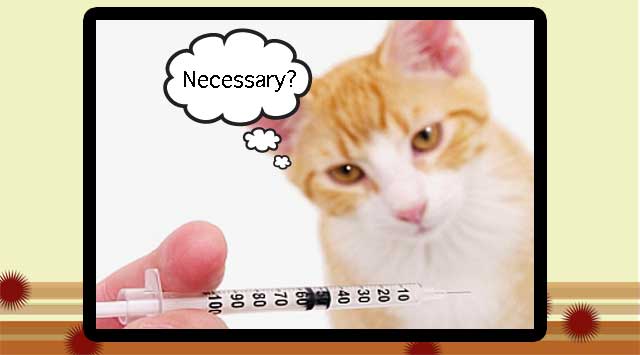It is useful for a cat caretaker to know of the likelihood of a cat vaccination reaction and the type of reaction.

A large British survey produced the following information:
Adverse reactions occurred in one in every 15,000 inoculations. They usually occur in cats under the age of 6 months.
The adverse reactions in descending order of prevalence are:
- lameness/polyarthritis – 18%
- local injection site reaction – 9%
- lack of efficacy (failure of the inoculation) – 6%
- upper respiratory tract disease – 6%
- sarcomas (tumors)- 3%
Sarcomas are perhaps the best known adverse reactions. They are not caused by the vaccination itself but a genetic predisposition by the cat to developing a sarcoma after an area becomes inflamed for whatever reason. The incidence of injection-site sarcomas is estimated to be one on ten thousand to thirty thousand (1 in 10k-30k).
A well known vet/author Dr Fogle tells us how he vaccinates his cats. He vaccinates kittens against feline infectious enteritis and the cat flu viruses feline herpes virus-1 (FHV-1) and feline calicivirus (FCV). See a page on feline viruses.
The American Academy of Feline Medicine and the American Association of Feline Practitioners both recommend that there should be a first annual booster and thereafter no more frequently than every three years for feline infectious enteritis and ‘in general’ no more than every three years for FHV-1 and FCV.
In Britain boarding catteries often demand proof of vaccination within the past 12 months. This clashes with the above guidelines.
Dr Fogle does not vaccinate his cats against the following:
- Bordetella bronchiseptica which can cause sneezing in cats and a nasal discharge. This disease responds well to antibiotics.
- Feline chlamydophilosis which causes severe conjunctivitis which can be treated with antibiotics. Vaccination does not necessarily prevent infection.
- Feline coronavirus. An intranasal vaccine is available in many places but its effectiveness is questioned.
- Feline immunodeficiency virus (FIV). In the USA a vaccine is available but its effectiveness has been questioned.
Testing for levels of protection against infection by serological testing (testing of blood serum) is not reliable according to Dr Fogle.
Cat vaccination recommendations have evolved and changed over the years. The trend is towards less, as you probably know, because the downsides can begin to outweigh the upsides. However, I feel the situation is rather confused. It is tricky for the customer cat caretaker to formulate opinions of their own. I don’t know if people will disagree or agree with that but it is the way I feel about cat vaccination recommendations.

My precious Suzanna became paralyzed in her back legs/tails from vaccines. The tech hit her spine with the vaccines, about 2 hours I found her paralyzed. Only because of an excellent Vet did she recover about 80%. (His clinic did NOT give the vaccines) She was the love of my life and I had her 8 more years.
Thank UK Katrina of the sharing your traumatic experience. I’m very pleased that another vet helped to recover her to 80% of her former self. It just goes to prove that even the most routine, simple veterinary procedures can go wrong and in fact it is often the simplest and most routine procedures that are more likely to go wrong because the veterinarian or the technician can tend to become more careless under these circumstances. Susanna had Turkish Van markings around her ears. There are very definite Turkish Van markings. The Turkish Van is, as you no doubt know, a well known purebred cat originating it is said from the Van district of Turkey. Quite a few random bred cats in the USA have these markings which appear to have been imported from Turkey.
Michael, Thank you so much.
Actually all four cats are extremely sensitive to any chemicals and or unnatural cat foods. I give them grain and soy free with no fillers, when I can.
Eva
Even pour unscented litter in the box [a thick top layer where they are exposed to the most].
Michael_ I have only allowed the basic doses to be administered to my Maine Coons. They already carry some hereditary immune deficiencies/and genetic traits [weakness].
Mama ‘Theo’ has been vaccinated only once; and she developed an upper respiratory disease, which is intermittent., a slight lameness in her back hip/leg area and since the vet gave her vaccinations at the same time I had her spayed [ a hormonal imbalance.She is now a full time patient and is too large to bathe herself. No-I do not overfeed._
I used front-line on all of them a few times in the past but NEVER AGAIN. Hair loss and dermatitis, seisures and other obvious signs of poisoning.
Eva says My cats are 10 & 11-years old now.
Your comment is interesting to me. Theo is very sensitive to medication of any kind it seems. I have not heard of that sort sensitivity before. I can see you being a great nurse/doctor to her.